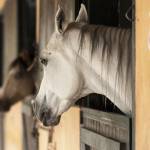Managing Equine Gastric Ulcers Through Nutrition

Scientists know that diet contributes to the formation of gastric ulcers in horses, but what can horse owners do about established ulcers? Can diet adjustments help heal painful divots in the stomach lining? According to a recent study*, medication is still necessary for most horses, but diet and nutritional supplements can also play important roles in successfully managing ulcers.
“All ages and breeds of horses are susceptible to equine gastric ulcer syndrome, or EGUS, with ulcers forming not only in the squamous portion of the stomach but also the distal esophagus, glandular portion of the stomach, and the proximal aspect of the duodenum,” explained Kathleen Crandell, Ph.D., a Kentucky Equine Research (KER) nutritionist.
According to the study, medications, principally omeprazole, should be used to heal ulcers initially. The following management tactics will help maintain healing and prevent recurrence:
- Use a research-proven digestive aid such as RiteTrac, available in the U.S. and other markets, which supports the health of the stomach. Horse owners in Australia should look for these effective digestive aids.
- Offer as much fiber or forage as possible, and avoid prolonged periods without forage (e.g., during transport and overnight);
- Consider alfalfa (lucerne) hay, as it provides some natural buffering qualities;
- For horses in little or no work and “easy keepers,” offer a lower energy forage and maximize the amount of time spent consuming the feed (e.g., use small-hole haynets);
- Use low-starch feeds whenever possible to reduce hyperactivity and stress, and minimize their effects on stomach health;
- To decrease meal size and avoid overconsumption of starch in grain, gradually introduce a high-fat supplement, such as stabilized rice bran, an ideal feed ingredient for horses with ulcers, as its high levels of omega-6 fatty acids have been shown to reduce acid secretion and increase output of protective prostaglandins;
- Allow pasture turnout as much as possible, even if a grazing muzzle needs to be used;
- Ensure horses have access to water at all times; and
- Avoid stressful situations as much as possible.
As always, consult with your veterinarian or an equine nutritionist prior to instituting changes in your horse’s diet and implement safe supplement strategies.
*Andrews, F.M., C. Larson, and P. Harris. Nutritional management of gastric ulceration. Equine Veterinary Education. In press.








